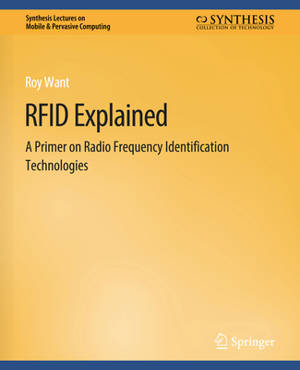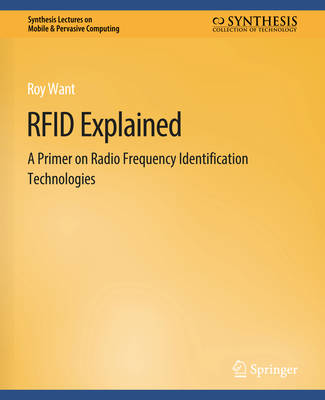
- Afhalen na 1 uur in een winkel met voorraad
- Gratis thuislevering in België vanaf € 30
- Ruim aanbod met 7 miljoen producten
- Afhalen na 1 uur in een winkel met voorraad
- Gratis thuislevering in België vanaf € 30
- Ruim aanbod met 7 miljoen producten
Zoeken
Omschrijving
This lecture provides an introduction to Radio Frequency Identification (RFID), a technology enabling automatic identification of objects at a distance without requiring line-of-sight. Electronic tagging can be divided into technologies that have a power source (active tags), and those that are powered by the tag interrogation signal (passive tags); the focus here is on passive tags. An overview of the principles of the technology divides passive tags into devices that use either near field or far field coupling to communicate with a tag reader. The strengths and weaknesses of the approaches are considered, along with the standards that have been put in place by ISO and EPCGlobal to promote interoperability and the ubiquitous adoption of the technology. A section of the lecture has been dedicated to the principles of reading co-located tags, as this represents a significant challenge for a technology that may one day be able to automatically identify all of the items in your shopping cart in a just few seconds. In fact, RFID applications are already quite extensive and this lecture classifies the primary uses. Some variants of modern RFID can also be integrated with sensors enabling the technology to be extended to measure parameters in the local environment, such as temperature & pressure. The uses and applications of RFID sensors are further described and classified. Later we examine important lessons surrounding the deployment of RFID for the Wal-Mart and the Metro AG store experiences, along with deployments in some more exploratory settings. Extensions of RFID that make use of read/write memory integrated with the tag are also discussed, in particular looking at novel near term opportunities. Privacy and social implications surrounding the use of RFID inspire recurring debates whenever there is discussion of large scale deployment; we examine the pros and cons of the issues and approaches for mitigating the problems. Finally, the remaining challenges of RFID are considered and we look to the future possibilities for the technology. Table of Contents: Introduction / Principles of Radio Frequency Identification / RFID Industry Standards / Reading Collected RFID Tags / Applications of RFID Tagging / RFID Incorporating Sensing / Deployment and Experience with RFID Systems / Privacy, Kill Switches, and Blocker Tags / Opportunities for RFID Integrated with Memory / Challenges, Future Technology, and Conclusion
Specificaties
Betrokkenen
- Auteur(s):
- Uitgeverij:
Inhoud
- Aantal bladzijden:
- 86
- Taal:
- Engels
- Reeks:
Eigenschappen
- Productcode (EAN):
- 9783031013461
- Verschijningsdatum:
- 31/12/2007
- Uitvoering:
- Paperback
- Formaat:
- Trade paperback (VS)
- Afmetingen:
- 191 mm x 235 mm
- Gewicht:
- 199 g

Alleen bij Standaard Boekhandel
+ 59 punten op je klantenkaart van Standaard Boekhandel
Beoordelingen
We publiceren alleen reviews die voldoen aan de voorwaarden voor reviews. Bekijk onze voorwaarden voor reviews.











